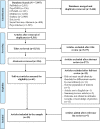Latinx individuals' knowledge of, preferences for, and experiences with prenatal genetic testing: a scoping review
- PMID: 35668466
- PMCID: PMC9169270
- DOI: 10.1186/s12978-022-01438-2
Latinx individuals' knowledge of, preferences for, and experiences with prenatal genetic testing: a scoping review
Abstract
Background: The American College of Obstetricians and Gynecologists recommends prenatal genetic testing (PGT) be offered to all pregnant persons regardless of known risk factors. However, significant racial/ethnic differences exist regarding acceptance of PGT contributing to disparities. Latinas (Latinx), one of the fastest growing ethnic groups in the United States, have low PGT acceptance rates. This systematic scoping review aimed to provide a landscape of existing literature on Latinx individuals' knowledge of, preferences for, and experiences with prenatal and preconception genetic testing. Synthesizing the current state of the science may inform development of culturally tailored interventions to support high-quality PGT decisions (e.g., informed, aligned with a pregnant persons' values).
Methods: We conducted a structured, systematic literature search of published articles and gray literature in electronic databases (PubMed, PsycINFO, CINAHL, Medline, Embase, Eric, Social Services Abstracts, and PsycArticles). Articles in English published prior to March 2021 were retrieved relating to genetics, pregnancy, and Latina women. Articles underwent title, abstract and full-text review by independent investigators to assess inclusion and exclusion criteria. Risk of bias was evaluated by two investigators. Iterative thematic analysis was employed to group study findings into themes to identify possible targets for interventions.
Results: The search generated 5511 unique articles. After title screening, 335 underwent abstract review and subsequently 61 full-text review. Twenty-eight studies met inclusion criteria and 7 additional studies were included after reviewing reference lists. Three overarching themes emerged: genetic knowledge/literacy (26/35, 74%), provider (mis)communication/patient satisfaction (21/35, 60%), and cross-cultural beliefs (12/35, 34%). Studies indicate discordant patient-provider language (n = 5), miscommunication (n = 4), and lack of concordant decision-making (n = 4) pose barriers to high-quality PGT decisions. Immigration status (n = 1) and religious beliefs (n = 5) are additional factors influencing PGT decisions.
Conclusions: Identified studies suggest that cultural and linguistic factors affect Latinx PGT decision-making. Latinx individual's comprehension and recall of PGT information is enhanced by culturally and linguistically concordant providers-suggesting that culturally-informed interventions may enhance PGT acceptability and support high-quality decisions. Future directions to surmount PGT disparities may include community health workers and cultural brokers to empower Latinx people to make informed decisions aligned with their values and preferences.
Keywords: Attitudes; Genetic counseling; Genetic literacy; Genetic testing; Genomic healthcare; Health literacy; Latinx populations; Prenatal testing.
Plain language summary
Significant racial, ethnic, and language disparities exist in prenatal genetic testing (PGT). Latina (Latinx) people, one of the fastest growing ethnic groups in the United States, have low acceptance rates of PGT. This scoping review provides a systematic search of the literature to better understand Latinx individuals’ knowledge of, preferences for, and experiences with PGT. Eight electronic data bases were systematically searched and identified articles underwent title, abstract, full text, and reference review. Iterative thematic analysis was conducted to group article findings into themes. Thirty-five studies met inclusion criteria and three overarching themes were identified: genetic knowledge/literacy, provider (mis)communication/patient satisfaction, and cross-cultural beliefs. Findings indicate that discordant patient-provider decision making and language and patient provider miscommunication pose barriers to high-quality PGT decisions. Latinx individuals’ understanding and recall of PGT information is improved when delivered in a culturally and linguistically concordant manner. This suggests culturally-informed interventions, including the use of community health workers or cultural brokers, may enhance PGT acceptability and support high quality pregnancy decisions.
© 2022. The Author(s).
Conflict of interest statement
The authors have no financial or non-financial competing interests to disclose.
Similar articles
-
Beyond the black stump: rapid reviews of health research issues affecting regional, rural and remote Australia.Med J Aust. 2020 Dec;213 Suppl 11:S3-S32.e1. doi: 10.5694/mja2.50881. Med J Aust. 2020. PMID: 33314144
-
Latinx attitudes, barriers, and experiences with genetic counseling and testing: A systematic review.J Genet Couns. 2023 Feb;32(1):166-181. doi: 10.1002/jgc4.1632. Epub 2022 Oct 27. J Genet Couns. 2023. PMID: 36301246 Free PMC article.
-
Improving Cultural Competence to Reduce Health Disparities [Internet].Rockville (MD): Agency for Healthcare Research and Quality (US); 2016 Mar. Report No.: 16-EHC006-EF. Rockville (MD): Agency for Healthcare Research and Quality (US); 2016 Mar. Report No.: 16-EHC006-EF. PMID: 27148614 Free Books & Documents. Review.
-
Palliative care experiences of adult cancer patients from ethnocultural groups: a qualitative systematic review protocol.JBI Database System Rev Implement Rep. 2015 Jan;13(1):99-111. doi: 10.11124/jbisrir-2015-1809. JBI Database System Rev Implement Rep. 2015. PMID: 26447011
-
How have interventions targeting pregnant women from refugee, migrant and culturally and linguistically diverse backgrounds living in high-income countries been developed or tailored to meet community needs? A systematic scoping review of stillbirth-related literature.BMC Pregnancy Childbirth. 2025 Jan 31;25(1):103. doi: 10.1186/s12884-024-07091-w. BMC Pregnancy Childbirth. 2025. PMID: 39891120 Free PMC article.
Cited by
-
Racial and Ethnic Disparities in Genomic Healthcare Utilization, Patient Activation, and Intrafamilial Communication of Risk among Females Tested for BRCA Variants: A Mixed Methods Study.Genes (Basel). 2023 Jul 15;14(7):1450. doi: 10.3390/genes14071450. Genes (Basel). 2023. PMID: 37510354 Free PMC article.
-
The completion of indicated paternal prenatal genetic and carrier testing at a public hospital in Los Angeles, California.Genet Med Open. 2023 Sep 1;1(1):100831. doi: 10.1016/j.gimo.2023.100831. eCollection 2023. Genet Med Open. 2023. PMID: 39669241 Free PMC article.
-
Approaches to Incorporation of Preferences into Health Economic Models of Genomic Medicine: A Critical Interpretive Synthesis and Conceptual Framework.Appl Health Econ Health Policy. 2025 May;23(3):337-358. doi: 10.1007/s40258-025-00945-0. Epub 2025 Jan 20. Appl Health Econ Health Policy. 2025. PMID: 39832089
-
Psychometric Properties of a Culturally Adapted Spanish Version of the Attitudes toward Genomics and Precision Medicine Instrument.Public Health Genomics. 2025;28(1):196-204. doi: 10.1159/000546101. Epub 2025 Apr 26. Public Health Genomics. 2025. PMID: 40288363
References
-
- National Academies of Sciences Engineering and Medicine. Understanding Disparities in Access to Genomic Medicine: Proceedings of a Workshop. In Washington, D.C.: National Academies Press; 2018. - PubMed
Publication types
MeSH terms
Grants and funding
LinkOut - more resources
Full Text Sources
Miscellaneous


